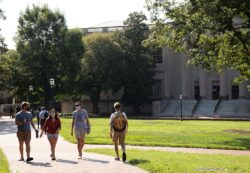Covid-19 at U.S Colleges (Update): Quarantine Dorms & Suspensions
October 09, 2020 :: Admissionado
For those in or entering college, COVID-19 has been disheartening and, perhaps most of all, simply confusing. To help you get a handle on how higher education is responding to the evolving situation, here is our the bi-weekly College & COVID update.
This week’s higher ed headlines discussed the ingenuity of college freshmen taking the campus experience online, a president coming down with COVID (not the president you are thinking of), and the punishments doled out for student COVID violations.
By the numbers
First, however, let’s update the numbers. According to the New York Times, there have been about 178,000+ cases of Coronavirus on more than 1400 college campuses around the country. Those numbers include cases that occurred during the spring 2020 semester, as the outbreak began, but there has been a notable spike since students returned to campus. The CDC reported that COVID-19 cases among young adults rose by 55% from early August to early September, and said this was likely linked to college students returning to campus.
Quarantine and Punishment
Many local authorities have put in place policies to ensure social distance on campus, regular testing, and quarantines where cases have emerged. Perhaps the most extreme example is in Boulder County (home of CU Boulder and 33,000-plus students), where county officials banned gatherings “of any size” among 18-22 year-olds in the county, defining a gathering as “more than one individual coming together or being physically near each other for any shared and common purpose, including socializing or participating in any activity together including but not limited to shopping, dining, or exercising.”
Where local authorities have not stepped in, colleges and universities have crafted their own policies. For example, the California State University system announced that they would remain online through the spring 2021 semester, while the Big Ten Conference decided last week to go ahead with the Fall football season starting Oct. 23. Of the colleges that have chosen to return to on-campus instruction, a variety of restrictive policies have been put in place to prevent outbreaks. However, administrations are having difficulty adjudicating violations, and some have had to shut down their campuses entirely, as in Madison, Wisconsin.
Universities from Middlebury to Penn State to Arizona imposed real punishment for students breaking the rules. Penn State reported earlier this week that they have suspended 10 students, removed 17 from on-campus housing, put 204 on probation, and issued warnings to 1,046. However, in Florida, schools suspending their students for breaking COVID rules found themselves on the wrong side of Governor Rick DeSantis, who defended a college student’s right to party, saying, “That’s what college kids do.”
A Bright Spot
Not all the news is bad, though. In Boston—a relatively small city with more than 100 colleges and universities packed within its borders—college freshmen have come together to recreate the city’s famed communal college experience online. A freshman at Tufts University created the account “collegeboston2024” to connect with fellow students and replace the in-person encounters that typify Boston campus life. The account has gained such a huge following that it now takes seven students to manage it.
Staff and Faculty Safety
On a less positive note, it has become clear this week that high office does not protect one from an indiscriminate disease. The president of the University of Notre Dame tested positive for COVID-19 this week after attending an event at the White House. While his symptoms are mild and he has stated he will continue working from home, many university staffers around the country are not so lucky, and they have been making their concerns known. Resident Advisors at the University of Michigan were on strike through much of September, speaking out against a lack of safety protocol, equipment, and transparency in administrative policymaking, and not enough enforcement of pandemic preventative rules on campus. They reached an agreement with the administration last week to end the strike in return for prioritized testing, greater PPE, and hazard pay.
Online Learning Still Costs Money
Finally, those hoping that online learning might mean discounted tuition (especially in light of grim online learning statistics that show reduced educational efficacy) will be disappointed to learn that a federal judge dismissed a class-action suit brought by two Northeastern University students asking for a tuition refund. Students my wish they hadn’t paid thousands or tens of thousands of dollars for online courses, but the fine print of their tuition agreement does not guarantee in-person classes so it is unlikely that arguments for a refund will hold up in any court. The judge in the Northeastern case did support the possible refund of the campus recreation fee, however, as that is explicitly intended to allow students access to on-campus facilities.
Most admissions consultants agree we are still far from the finish line when it comes to living with COVID-19. As long as it continues to affect the way we live, learn, and work, we’ll continue to keep you updated. Join us here again in two weeks’ time for the next College & COVID update!



